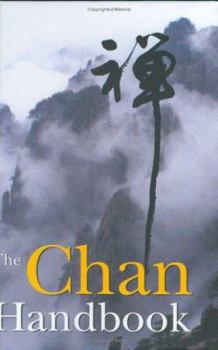The Chan Handbook: Talks about Meditation
No todos han tenido la suerte de asistir a un retiro de meditaci n con el maestro Chan, pero todos pueden beneficiar del manual que explica los principios esenciales de la meditaci n Chan tal como fue... This description may be from another edition of this product.
Format:Paperback
Language:English
ISBN:0881399515
ISBN13:9780881399516
Release Date:April 2005
Publisher:Buddhist Text Translation Society
Length:197 Pages
Weight:0.70 lbs.
Customer Reviews
5 ratings
The Chan Handbook
Published by Thriftbooks.com User , 15 years ago
The Venerable Master Hsuan Hua left his home life at the age of nineteen. In 1962, he came to America where he lectured on Mahayana canon. He also established the Dharma Realm Buddhist Association, the City of Ten Thousand Buddhas, and the International Translation Institute. The Chan Handbook is a translation of the Venerable Master Hua's teachings. These works challenge the reader to investigate Chan and lays out the proper steps of meditation for stilling the mind. The Master also discusses common misconceptions and missteps of the beginner in their attempts to quicken the enlightenment process. Near the end of the book is a series of questions and answers. Here the Master has included common questions and problems. He is both frank and resolute in his answers often reminding readers that hard work, focus, and endurance is required in Chan.
the chan handbook
Published by Thriftbooks.com User , 15 years ago
A real Dharma treasure.Highly recommended,concrete and rich.A helpfull guide for zen and not only, practice.
Just do it
Published by Thriftbooks.com User , 17 years ago
Intimate advice on meditation from Master Hua (1918-1995). Rather than just stimulating me to think about Chan Buddhism, these talks did indeed lead me to sit down and practice. That's good because as a book reader and reviewer, reading too much and thinking too much are real dangers for me. Not that reading about Buddhism and meditation are bad, they have been a big help in deepening my Buddhist understanding and practice, but to do so to the exclusion of practice wouldn't help me. To the extent I continue without going to a teacher, books like this one are essential. How many of them is another question. Too many cooks? Master Hua's teachings on mediations seem consistent with those of Master Sheng Yen (Attaining the Way: A Guide to the Practice of Chan Buddhism). As outstanding as Master Sheng Yen is, Master Hua seemed more intimate and focused on sitting meditation and the use of a meditation topic ("huatou" as Master Sheng Yen refers to it): Master Sheng Yen provides more details but after reading Master Hua I am not sure such details are necessary. "The Chan Handbook" is well-organized, 6 chapters of teachings, divided into several page subsections, followed by a question and answer chapter, a chapter of verses by Master Hua, the Eighteen Great Vows of Venerable Master Hua (which serve as a strong reminder of Chan Buddhism's place within Mahayana Buddhism) and a list of contacts for the Dharma Realm Buddhist Association, the most notable being the City of Ten Thousand Buddhas in Northern California (which is one of the largest Buddhist communities in the West). Somehow until I found this book I did not know of Master Hua and the City of Ten Thousand Buddhas: the world is full of treasures if one only looks! Master Hua teaches in this book out of his own wisdom: there are some references, of course, to earlier Chan masters but not so much to Chan Buddhist history or any intellectualizing (as may be found with the contemporary Zen master Gudo Nishijima's efforts to explain the Four Noble Truths in terms of Dogen's explanatory style in A Heart To Heart Chat On Buddhism With Old Master Gudo. There is less precision and thoroughness than may be found in Master Sheng Yen's Attaining the Way: A Guide to the Practice of Chan Buddhism but now that I have read this book, I am not sure Master Sheng Yen's details are necessary. Different styles at any rate, Nishijima, Sheng Yen and Hua, I could not say one would be best for you. Master Hua uses both gradual enlightenment and sudden enlightenment in his teachings: he explains that sudden enlightenment depends on daily cultivation. He speaks of "sweet dew", a sweetening of the saliva during meditation, that sounds Taoist. I have not looked for that or experienced that (yet). He teaches using a story that a Chan master will be able to control his/her own birth and death. How literally to take this? Is it intended only to emphasize the benefits of the presence and energy that comes with Chan meditatio
Excellent Chan meditation resource
Published by Thriftbooks.com User , 17 years ago
This is one of the best Chan meditation resource - certainly a recommended read for everyone - interested in meditation or not.
An excellent introduction to the concept of chan meditation, preserving the wisdom of a teacher
Published by Thriftbooks.com User , 18 years ago
The Chan Handbook condenses the essential principles of chan meditation as taught by the late Tripitika Master Hsuan Hua, former instructor at the Nan Hua Monastery in Canton, China, into straightforward quotes of the Master's words taken from a 40-year period during the course of his life. Pages relate in plain terms accessible to lay readers the benefits of meditation, how to meditate, the states of meditation, how to reach nirvana, and more. Subdivided sections of The Chan Handbook are only a few paragraphs or pages long, each clarifying a core principle such as "Only quiet contemplation can initiate Chan", "Concentrate on a single meditation topic", or "Enlightenment must be certified before it counts". An excellent introduction to the concept of chan meditation, preserving the wisdom of a teacher for those who never had the opportunity to learn from him directly.





